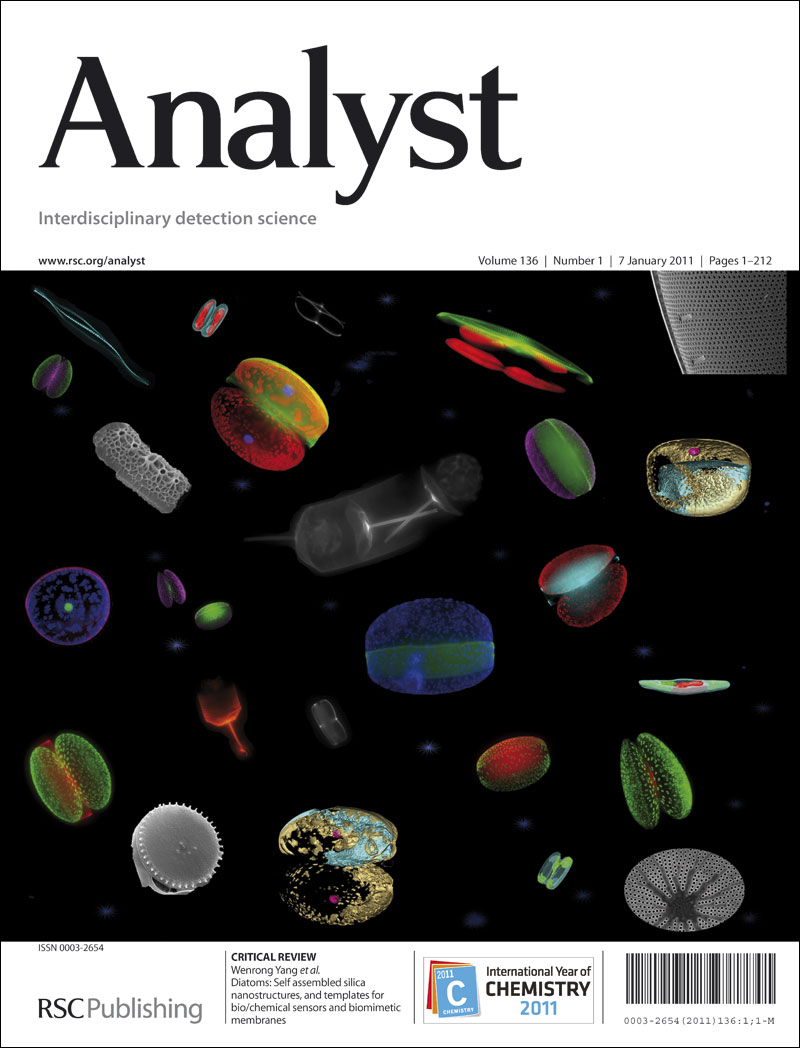Gold Disk Microelectrode Coupled Label-free Electrochemical Aptasensor for Dopamine Assay
IF 3.6
3区 化学
Q2 CHEMISTRY, ANALYTICAL
引用次数: 0
Abstract
We fabricate gold disk microelectrode (Au DME) and develop a label-free electrochemical aptasensor for highly sensitive and selective detection of dopamine (DA) in a brain slice by using anti-DA specific aptamer as molecular recognition element and DA oxidation signal as analytical signal. The Au DME with a disk-shaped geometry and a radius in range from 1.25 to 4 μm is fabricated by fine tuning of the size of gold microwire inside a borosilicate capillary with laser-assisted pulling and mechanical polishing method for easily positioning the target object. A label-free electrochemical aptasensor is fabricated by self-assembling an anti-DA specific aptamer on the surface of Au DME with a radius of 2 μm. The obtained aptasensor can directly detect DA based on the oxidation current of DA as analytical signal, in which the recognition of DA by the anti-DA specific aptamer immobilized on Au DME allow DA close to the electrode surface and facilitate the electrochemical oxidation of DA. Taking advantage of Au DME with a small capacitive current and anti-DA specific aptamer with good binding affinity to DA, the label-free electrochemical aptasensor not only can sensitively detect DA with a wide linear range of 0.5 to 27 μM and a low detection limit of 0.11 μM, but also can selectively detect DA in the presence of other interference neurochemicals. Moreover, the label-free electrochemical aptasensor is successfully applied in the recording of the dynamic increase of DA in a brain slice from mice upon electrical stimulation. This work provides a promising strategy for the preparation of label-free electrochemical aptasensor based on microelectrode with high spatial resolution, sensitivity and selectivity to determinate neurochemicals dynamics in living systems.金圆盘微电极偶联无标记电化学感应传感器用于多巴胺测定
本研究以抗多巴胺特异性适配体为分子识别元件,以DA氧化信号为分析信号,制备了金圆盘微电极(Au DME),开发了一种无标记的电化学适配体传感器,用于高灵敏度、高选择性地检测脑片中的多巴胺(DA)。采用激光辅助拉丝和机械抛光的方法,在硼硅毛细管内对金微丝的尺寸进行微调,制备了半径为1.25 ~ 4 μm的圆盘状Au DME。通过在半径为2 μm的Au - DME表面自组装抗da特异性适配体,制备了无标记电化学适配体传感器。所获得的适体传感器可以直接以DA的氧化电流作为分析信号来检测DA,其中固定在Au - DME上的抗DA特异性适体对DA的识别使DA接近电极表面,有利于DA的电化学氧化。利用Au - DME电容电流小、抗DA特异性适配体与DA结合亲和力好的特点,该无标记电化学适配体不仅可以在0.5 ~ 27 μM的宽线性范围内对DA进行灵敏检测,检测限低至0.11 μM,而且可以在其他干扰神经化学物质存在的情况下选择性检测DA。此外,还成功地将无标记电化学感应传感器应用于电刺激小鼠脑切片DA的动态增加记录。本研究为制备具有高空间分辨率、高灵敏度和高选择性的无标记电化学感应传感器提供了一种有前景的方法。
本文章由计算机程序翻译,如有差异,请以英文原文为准。
求助全文
约1分钟内获得全文
求助全文
来源期刊

Analyst
化学-分析化学
CiteScore
7.80
自引率
4.80%
发文量
636
审稿时长
1.9 months
期刊介绍:
"Analyst" journal is the home of premier fundamental discoveries, inventions and applications in the analytical and bioanalytical sciences.
 求助内容:
求助内容: 应助结果提醒方式:
应助结果提醒方式:


